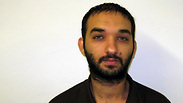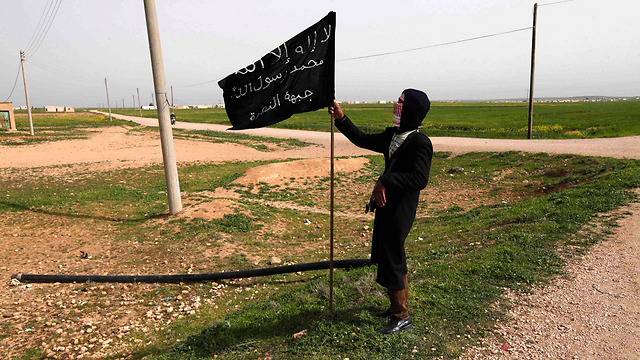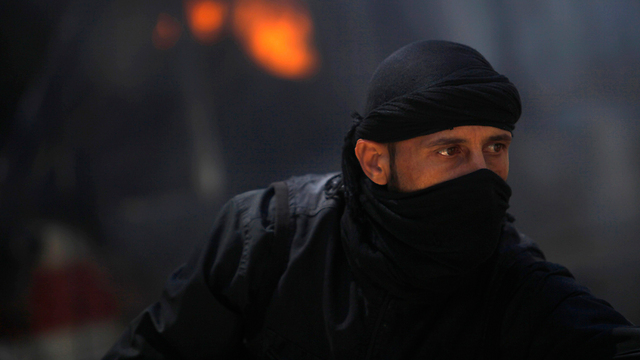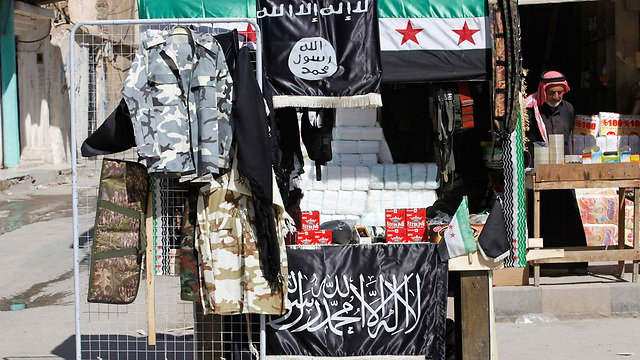
Arab-Israeli's 72-hours with al-Qaeda linked Syrian rebels
Abed Altala from Tayibe wanted to aid Syrian rebels, wage jihad against Assad. Transcript of his Shin Bet interrogation reveals how he crossed into Syria, toured Idlib with al-Qaeda linked group
At first, Altala claimed he had entered Syria to aid the wounded, however, in the transcript of his Shin Bet interrogation obtained by Ynet he admits: "I joined an al-Qaeda affiliated organization with the intention of raging a jihad war."
Related stories:
- Taibe resident indicted after he joins Syrian rebels
- Missing Israeli students suspected of infiltrating Syria
- Guile and guns: How Jabhat al-Nusra govern
"I told Himam, a Salifist friend from Jordan, that I want to join the Jabhat al-Nusra because they want to establish a state on the basis of Islamic law," he told investigators. "We agreed that in the month and a half before I go to Syria we'll stop talking about it so as to not arouse suspicions."

Jabhat al-Nusra flag (Photo: Reuters)
In response, his investigators said: "But they are affiliated with al-Qaeda which considers Israel its enemy," to which Altala responded: "My intention was to fight Assad's regime." Later in his interview, however, he admitted: "After the Syrian regime will fall and a Sharia state will be formed, jihad will turn its attentions to battling Israel, no doubt."
Day One
Abed took a plane from Amman to Istanbul on July 7, at the beginning of the Ramadan. "From Istanbul I flew to Antika, near the Turkish-Syrian border," he recalled. "From there I took a 50$ cab to Rehaniya – a city with many Syrians."
He came to the Turkish side of the border crossing and tried to enter with his Israeli passport, but the Turkish border guards told him that only Syrians can enter the country from the southern border. But Altala refused to give up.
Jabhat al-Nusra, Allah will protect you
"I joined a group of Syrians walking towards the border and we crossed a barbed-wire fence, that's when I understood that I was on Syrian territory. There I met a 25-year-old named Alaa, who asked me if I came to fight. I told him no, only to aid the wounded.
"I entered deeper into Syria with him through a checkpoint called 'Bab Alohu' and along the way we hitched a ride with an old man for NIS 20. The rebels didn't ask us anything at the checkpoint, we just wandered near makeshift encampments, one belonging to the UN, others to Qatar and humanitarian organizations. Along the way I saw many armed men, some with uniforms, others without."
Idlib on motorcycle
Abed then reached Idlib in northern Syria, where the rebels had succeeded in achieving significant gains – but these victories belonged more to the Free Syrian Army than to radical jihad groups. "Along the way, me and Alaa were stopped by a group of radical Islamists called Aldula. These are the guys who make al-Qaeda look like angels. They took our names and offered us to join them, but we told them we were on our way to the hospital," he told investigators.
However, his actual destination was the Jabhat al-Nusra headquarters. At the recommendation of his Jordanian friends he was told to look for Abu Anas al-Tababsi, a senior figure in the group, in the town of Taftanes.

Jabhat al-Nusra fighter (Photo: Reuters)
"It was a hostel, a makeshift intake center for new fighters adjacent to a rebel munitions warehouse. When I arrived, there were two fighters already there… and after some time a third joined us, he said he was in charge of administration and asked me who I was. I told him I am a Palestinian from 1948. He passed on my name to the 'Mujahedeen Emir' – the head of enlisters – and told me to wait."
Jabhat al-Nusra participate in Aleppo battle
On his second day in Syria he was treated to a motorbike tour of the region, courtesy of a Jabhat al-Nusra operative. "There were many fighters from the organization, mostly in Afghani or Pakistani garb, with black flags reading 'Not Alaa but Allah.' I also saw men armed with RPGs. While I was with them I held a Kalashnikov and a sniper rifle."
Bombs away
On his third day, after another tour, Abed was reading the Koran in the group's intake center when they "heard a government MiG jet circling above. We quickly fled, fearing they would fire at us. In one of the tours I saw burnt houses and was told Assad uses smart bombs which burn the content of the house without destroying the structure."
During his third day, after he managed to get internet access and discovered the string of frantic messages his parents had left him, as well as pictures of his mother who seemed as if she was mourning him, he decided to return to Israel.
"I didn't tell the rebels as much. I just left the compound and took a cab north."
The Turkish border had been closed the day before, so for $100 he paid a Syrian smuggler to take him across. "We crossed a sewage river on a raft, and on the other side a cab awaited us. It took us to the main road where we switched cabs again. But this cab was full of Turks, and it took me straight to Antika. There I presented my Israeli passport and was released."
Abed, of course, was arrested by the Shin Bet the moment he landed in Israel after his father and uncle met him in Istanbul and put him on a plane. At first he claimed he had only gone to offer humanitarian assistance, but a polygraph test revealed he was lying prompting the prolonging of his interrogation as well as his eventual confession.
"Throughout my time in Syria I never revealed I was an Israeli, I hid my Israeli passport," he insists.

Fatigues for sale (Photo: Reuters)
Altala is not the first Israeli Arab to attempt to reach Syria through Jordan and Turkey and the phenomenon is inspiring much concern among the Shin Bet, who fear that al-Qaeda oriented international jihadists will take advantage of youths with Israeli passports to collect intelligence on Israel or even attack it.
Unlike his four predecessors, Altala is not being charged with national security offences because his interaction with rebels did not constitute a direct action against Israel. Instead, he is facing charges of contacting and fraternizing with a foreign agent.
His lawyer, Adv. Erez Abuhav from the Menahem Rubinstein Law Firm, said in response: "The events in Syria demand moral-strength from the Arab public – as well as the general public. The defendant acted from humanitarian motives. This case has no connection to maters of security."
- Receive Ynetnews updates directly to your desktop










